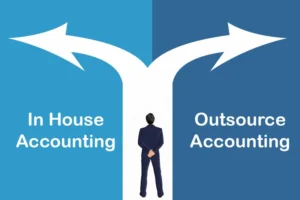Cash flow problems can hurt small businesses—82% fail because of them. Small business bookkeeping software keeps finances simple and organized. These bookkeeping tools for small businesses save time, ensure CRA compliance, and streamline GST/HST returns. Affordable bookkeeping software Canada trusts offers reliable solutions for 2025.
The best bookkeeping software Canada provides includes QuickBooks, FreshBooks, Wave, Xero, and Zoho Books. Each delivers features like invoicing and expense tracking to match your needs. This guide explains their pricing, benefits, and how SAL Accounting supports choosing the right bookkeeping tools for small businesses for stress-free growth.
Key Takeaways
- Pick QuickBooks or Xero to auto-file GST/HST—kiss CRA stress goodbye.
- Go for FreshBooks or QuickBooks to slash hours off invoicing and data entry.
- Match your budget: Wave’s free or QuickBooks at CAD 20/month.
- Choose Xero or Zoho Books to sync with your bank and apps, no more juggling.
The Best Bookkeeping Software for Canadian Small Businesses
Looking for the right bookkeeping tools for small businesses can be overwhelming. We’ve done the homework for you and tested these options with real Canadian business owners. Here are our top 5 picks:
1. QuickBooks Online
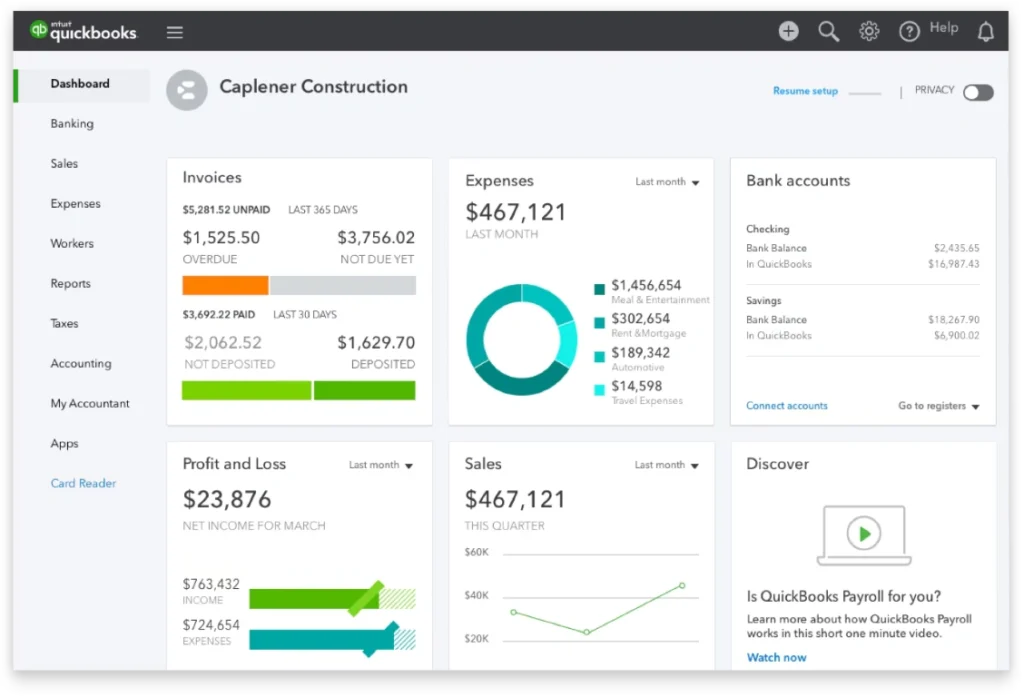
QuickBooks is the go-to choice for many Canadian businesses that need to handle inventory, employees, or more complex finances.
Key Features
- Handles GST/HST calculations and tax filing automatically
- Works with most Canadian banks
- Let’s you and your accountant work together in real-time
- Tracks inventory across different locations
- Comes set up for Canadian tax rules
Pros
- Works for almost any type of Canadian business
- Great app for scanning receipts on the go
- Lots of useful reports that you can customize
- Most accountants already know how to use it
Cons
- More expensive than other options
- Takes longer to learn (about 2-3 hours to set up)
- Customer support can be hit or miss
Pricing
- Basic: $25/month (invoices, expenses)
- Essentials: $40/month (adds bills, time tracking)
- Plus: $60/month (adds inventory, projects)
- Advanced: $100/month (adds better reporting, better support)
Real User Take: “QuickBooks saves my retail business in Toronto about 15 hours every month during tax season. The inventory tracking is a lifesaver.” — Michael, Fashion Store Owner
2. FreshBooks
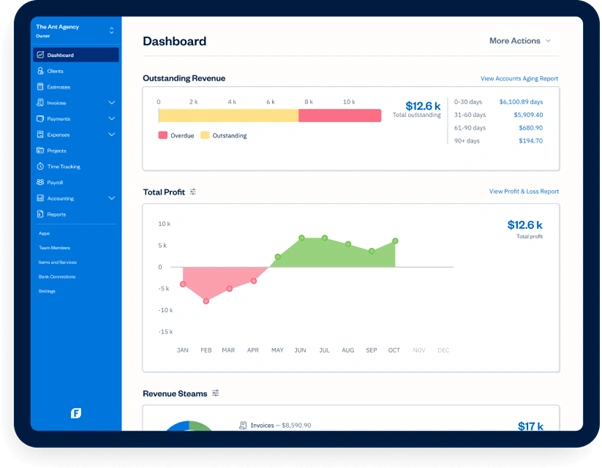
FreshBooks is perfect for freelancers and service businesses that care more about easy invoicing and less about complex accounting.
Key Features
- Simple invoicing with payment reminders
- Tracks your time and puts it straight onto invoices
- Shows if your projects are making money
- Clients can view and pay invoices online
- Makes GST/HST reporting simpler
Pros
- Easiest to use with plain language
- Quick to set up (usually under 30 minutes)
- Great at tracking expenses with photo receipts
- Mobile app works just as well as the desktop version
Cons
- Limited inventory tracking
- Fewer reports than QuickBooks
- Need to pay more for basic features like recurring invoices
Pricing
- Lite: $20/month (5 clients, unlimited invoices)
- Plus: $36/month (50 clients, payment reminders)
- Premium: $60/month (unlimited clients, project tracking)
Real User Take: “As a freelancer in Vancouver, FreshBooks helped me catch about 8 more billable hours each month that I was missing before. The invoicing is super simple.” — Sarah, Graphic Designer.
Read more: “Best eCommerce Accounting Software in 2025: Top Picks for Online Sellers”
3. Wave
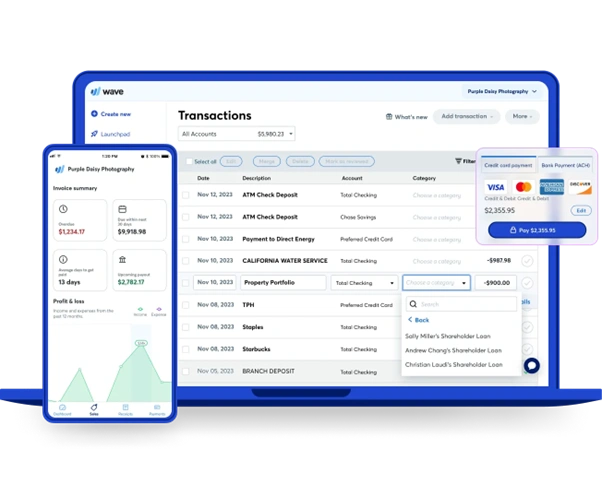
Wave is completely free and still powerful enough for startups and small businesses with basic needs.
Key Features
- Free accounting with unlimited invoices and expenses
- Connects to Canadian banks
- Tracks GST/HST
- Lets you scan receipts with your phone
- Separates personal and business expenses
Pros
- Completely free with no limits
- No hidden restrictions on the free plan
- Surprisingly good reports for a free tool
- Easy to use even if you’re not an accountant
Cons
- Can’t customize reports or invoices much
- Shows ads and tries to sell you payment processing
- Charges fees for processing payments (3.4% + $0.30 per credit card)
- Support is email-only and can be slow
Real User Take: “Wave does everything I need for my consulting business, and it’s free. I’m saving about $300 a year compared to paid software.” — Amir, Business Consultant
4. Xero
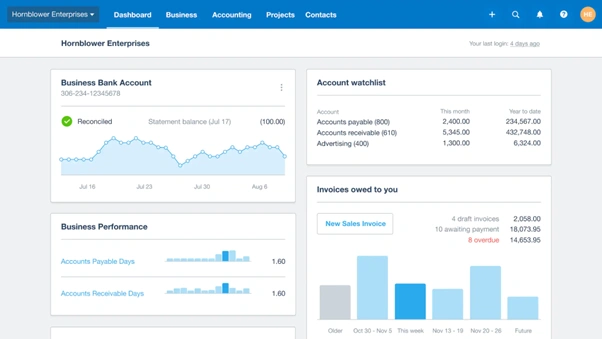
Xero grows well with your business, especially if you work internationally or have a more complex setup.
Key Features
- Handles multiple currencies with daily updates
- Unlimited users at no extra cost
- Tracks time and expenses for projects
- Strong inventory management
- Manages fixed assets and depreciation
Pros
- Most customizable dashboard and reports
- Great for businesses with multiple entities
- Connects well with other business systems
- Good tracking of who did what
Cons
- Takes longer to learn
- Needs third-party add-ons for Canadian payroll
- Fewer Canadian accountants know how to use it
- Need higher-tier plans for basic features
Pricing
- Early: $20/month (20 invoices, 5 bills)
- Growing: $35/month (unlimited invoices and bills)
- Established: $60/month (multiple currencies, projects)
Real User Take: “Xero helped our construction company see which jobs were making money. We increased our profits by about 12% after switching from spreadsheets.” — Jason, Construction Company Owner
5. Zoho Books
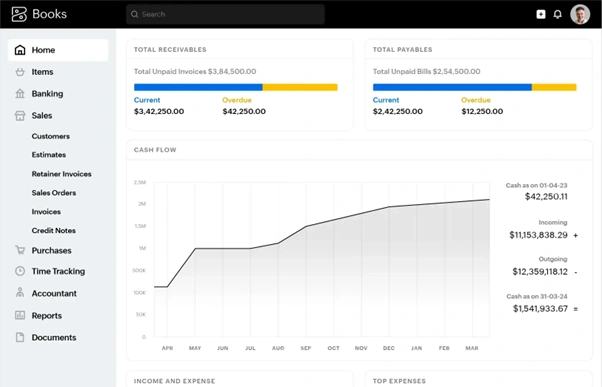
Zoho Books gives you the most bang for your buck, especially if you already use other Zoho products.
Key Features
- Handles GST/HST on invoices automatically
- Clients can approve estimates and pay online
- Automates repetitive bookkeeping tasks
- Works seamlessly with other Zoho products
- Lets you set approval rules for purchases
Pros
- Most affordable paid option (30-50% cheaper)
- Works great with other Zoho tools
- Most customizable invoice designs
- Good audit trail for compliance
Cons
- Not as many Canadian accountants know it
- Fewer integrations than QuickBooks
- Mobile app isn’t as good as the desktop version
- Less Canadian-specific help documentation
Pricing
- Standard: $12/month (3 users)
- Professional: $25/month (5 users, purchase orders)
- Premium: $50/month (10 users, more customization)
Which One Is Right for You?
Having too many options might be confusing. So, here’s a quick overview for you so that you can make the right call:
| Tool | Starting Price | Ease of Use | Best For | GST/HST Support | Free Plan? |
| QuickBooks | CAD 20/mo | Moderate | Small-Medium Businesses | ✅ | ❌ |
| FreshBooks | CAD 20/mo | Easy | Freelancers | ✅ | ❌ |
| Wave | Free | Easy | Startups | ✅ | ✅ |
| Xero | CAD 25/mo | Moderate | Growing Businesses | ✅ | ❌ |
| Zoho Books | CAD 12/mo | Easy | Startups w/ Zoho Suite | ✅ | ❌ |
Why Choosing the Right Bookkeeping Software Matters
Although having small business tax accountants is a must in today’s world, we can’t ignore the importance of choosing reliable small business bookkeeping software.
The Benefits of Bookkeeping Software
Say goodbye to the days of managing your finances in messy Excel sheets. Some of the benefits of investing in bookkeeping software include:
- Improved Efficiency: Automate repetitive tasks such as invoicing, bank reconciliation, etc.
- Tax Compliance: Automatically calculate GST/HST returns and generate CRA-compliant financial reports. For ongoing compliance assistance, consider our HST return services.
- Reducing Errors: Eliminate human errors in data entry that could result in costly errors.
What Canadian Small Businesses Should Look For
Businesses registered for the Goods and Services Tax / Harmonized Sale Tax (GST/HST) in Canada must adhere to GST/HST rules and submit reports to the Canada Revenue Agency (CRA). The right software that considers these requirements leads to smoother processes and actual relief.
Is the software directly connected to Canadian banks? Can it produce reports that are CRA-compliant? These are the questions you’re going to ask yourself come tax deadlines.
Pro Tip: Even small efficiency changes can allow you to spend more time building your business and less time on boring admin work.
Key Features to Look for in Bookkeeping Software
Whether you’re a startup or a business tycoon, your bookkeeping software should serve your specific needs. Here’s what to look for to determine the right solution.
1. Ease of Use
A simple, intuitive user interface is ideal for small business owners or freelancers. If you’ve never done bookkeeping before, it’s often best to start with a small business bookkeeping software like Wave or FreshBooks.
2. Automation Capabilities
Spend less time on admin tasks. Seek features such as reconciling your bank account automatically, recurring invoicing, and ushering expenses into their proper categories.
3. Tax and GST/HST Integration
Your software must handle GST/HST calculations for CRA compliance and allow you to easily prepare the tax-due report. Both QuickBooks Online and Zoho Books shine in this area.
Read more: “GST/HST Return in Canada: A Guide for Cross-Border Taxation”
4. Multi-Currency Support
If you work with international clients or suppliers, multi-currency support is key to handling exchanges and conversions. Xero provides this for businesses with global businesses.
5. Cloud vs. Desktop Options
- Perfect for mobility—cloud-based software like Xero and QuickBooks Online means that you can access your records from anywhere (needs an internet connection).
- Data storage with desktop software is not as flexible as with cloud accounting for small businesses, but it offers offline access.
6. Integrations
Just making sure that the software effortlessly connects with other tools—such as POS systems, payroll platforms or CRM tools—can save you a boatload of time (and irritation). Most of the options on this list (like QuickBooks and FreshBooks) are bookkeeping software with tax integration.
How to Choose the Right Bookkeeping Software for Your Business
With so many options available, here’s how to narrow down your choice.
1.Assess Your Needs
Do you need easy invoicing to simplify billing? Inventory tracking to keep tabs on what’s in stock? Or tax-ready reports to make CRA filing stress-free? Start by choosing software that fits your business and makes your life easier.
2.Consider Your Budget
Pick a tool that works for your budget. If you’re just starting out, Wave is a great free option with basic features like invoicing and expense tracking. For bigger businesses with more complex finances, QuickBooks offers payroll management, tax prep, and advanced reports. Think about what you really need before deciding.
3.Test Free Trials
Most platforms offer free trials, so take advantage! Try out the features, see if they work for you, and make an informed choice—no commitment needed.
4.Think About Scalability
Your business will grow, and your software should keep up. Look for tools that can scale with you, support new features, and integrate easily so you’re not stuck switching later.
Why Bookkeeping Software Beats Excel
Small business owners hesitant to change from Excel, take note: bookkeeping tools provide automation, better tax compliance, and CRA ready reports. These are time-saving advantages that Excel simply cannot match.
Did you know? Studies show that over 70% of organizations have shown economic growth due to automation!!
Case Study: How SAL Accounting Helped Grow a Retail Business
Meet Sarah, the owner of a growing boutique that sells handmade, eco-friendly craft materials. As her business took off, keeping track of inventory costs and balancing the books became a headache. Spreadsheets were messy, mistakes piled up, and tax season felt like a nightmare. She needed a reliable online bookkeeping solution—one that would take the stress off her shoulders so she could focus on what she loved: growing her business.
Steps
- Initial Consultation—Sarah contacted SAL Accounting for a consultation, during which we discussed her specific needs, including tracking inventory and automated tax preparation.
- Software Implementation—SAL Accounting helped Sarah transition her financial data from spreadsheets into bookkeeping software, ensuring a seamless setup process.
- Training & Support—The team provided Sarah with comprehensive training to help her become comfortable using the software and continued support whenever she faced challenges.
- Custom Features—Custom features, such as sales trends analysis and expense categorization, were set up to match Sarah’s business workflow.
Results
Three months later, Sarah had significant improvements. Invoice processing times were reduced to 50%, the error rates in financial reporting were almost non-existent, and tax was easy to prepare in the future with automated GST tracking. Sarah saved more than 10 hours a week, which she was able to devote to engaging with customers and launching new products. Through her engagement with SAL Accounting, her revenue increased 15% within one year, all thanks to the implementation of an effective bookkeeping system. If you’re looking to achieve similar results for your business, our specialized retail bookkeepers can help you streamline operations.
Final Thoughts
When it comes to bookkeeping tools for small businesses, you need to be sure to get the right ones in order to save time, avoid mistakes, and be compliant with CRA regulations. Suppose you’re handling invoices as a freelancer or juggling inventory as a business owner. In that case, solutions from the likes of QuickBooks, FreshBooks, Wave, Xero and Zoho Books meet various needs and price points.
Use free trials, review your workflow, and begin simplifying your finances today! For a more personalized, expert approach, contact us. Our corporate tax accountants team specializes in helping businesses like yours optimize their financial processes.
FAQs
The best bookkeeping software depends on your business’s unique needs. Popular options like QuickBooks, FreshBooks, and Wave are highly rated in Canada for their features, ease of use, and localization for Canadian users, including tax support.
FreshBooks and Wave are often recommended for beginners due to their intuitive interfaces and simple navigation. Both offer features tailored to small businesses or freelancers and provide helpful guides to get started.
QuickBooks is ideal for businesses needing robust accounting features, payroll integrations, and inventory management. However, because of its invoicing and time-tracking tools, FreshBooks is better suited for freelancers or service-based businesses.
Wave is a top free option in Canada, offering essential bookkeeping features like invoicing, expense tracking, and bank connections at no cost, along with optional paid services for added functionality.
QuickBooks, FreshBooks, and Xero are popular choices that include automated GST/HST calculations. These tools help businesses simplify tax compliance and proper reporting for the CRA.
While Excel is a cost-effective solution for basic bookkeeping, dedicated bookkeeping software offers automated features, enhanced reporting, and tax compliance capabilities, making them more efficient and scalable as your business grows.
Wave offers free essential features and is a great choice for startups on a budget. Other affordable options include Zoho Books, which provides tiered pricing plans, and FreshBooks, which has cost-effective packages for small businesses.
Yes, most modern bookkeeping software options, such as QuickBooks, Wave, and Xero, integrate seamlessly with Canadian banks. This feature allows for automatic transaction imports, which saves time and improves accuracy.
QuickBooks and Xero excel at helping Canadian businesses manage tax filing and meet CRA compliance. They offer features like GST/HST tracking, reporting, and filing assistance to ease the tax process.





